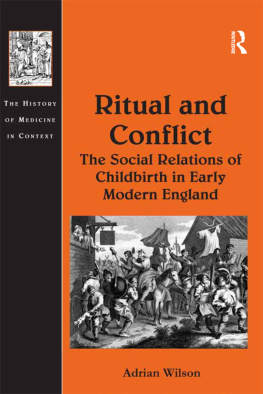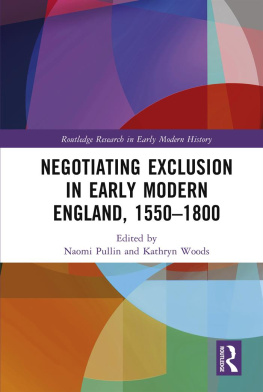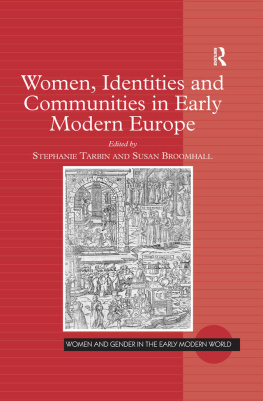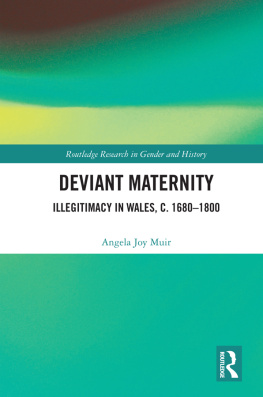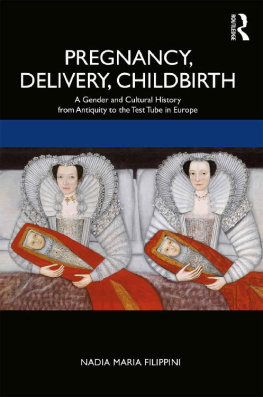RITUAL AND CONFLICT: THE SOCIAL RELATIONS OF CHILDBIRTH IN EARLY MODERN ENGLAND

The History of Medicine in Context
Series Editors: Andrew Cunningham and Ole Peter Grell
Department of History and Philosophy of Science
University of Cambridge
Department of History
Open University
Titles in the series include
The One-Sex Body on Trial: The Classical and Early Modern Evidence
Helen King
Medical Consulting by Letter in France, 16651789
Robert Weston
Female Patients in Early Modern Britain
Gender, Diagnosis, and Treatment
Wendy D. Churchill
Plague Hospitals
Public Health for the City in Early Modern Venice
Jane L. Stevens Crawshaw
Bad Vibrations: The History of the Idea of Music as Cause of Disease
James Kennaway
Regimental Practice by John Buchanan, M.D.:
An Eighteenth-Century Medical Diary and Manual
Edited by Paul Kopperman
Ritual and Conflict: The Social Relations of Childbirth in Early Modern England
ADRIAN WILSON
University of Leeds, UK
First published 2013 by Ashgate Publishing
Published 2016 by Routledge
2 Park Square, Milton Park, Abingdon, Oxon OX14 4RN
711 Third Avenue, New York, NY 10017, USA
Routledge is an imprint of the Taylor & Francis Group, an informa business
Copyright Adrian Wilson 2013
Adrian Wilson has asserted his right under the Copyright, Designs and Patents Act, 1988, to be identified as the author of this work.
All rights reserved. No part of this book may be reprinted or reproduced or utilised in any form or by any electronic, mechanical, or other means, now known or hereafter invented, including photocopying and recording, or in any information storage or retrieval system, without permission in writing from the publishers.
Notices:
Product or corporate names may be trademarks or registered trademarks, and are used only for identification and explanation without intent to infringe.
British Library Cataloguing in Publication Data
A catalogue record for this book is available from the British Library
The Library of Congress has cataloged the printed edition as follows:
Wilson, Adrian, 1947-
Ritual and conflict : the social relations of childbirth in early modern England / by Adrian Wilson.
pages cm. (The history of medicine in context)
Includes index.
ISBN 978-1-4094-6812-7 (hardcover)
1. ChildbirthEnglandHistory. 2. ObstetricsEnglandHistory. 3. Birth customsEnglandHistory. 4. MedicineEnglandHistory. I. Title.
RG518.G7W55 2014
618.2dc23
2013015420
ISBN 9781409468127 (hbk)
Contents
Acknowledgements
I first want to thank the scholars on whose published work I have drawn in these pages, and the archivists and librarians who have helped me over the years. Equally essential has been the assistance of the University of Leeds, in the form of sabbatical leave and teaching support which have made it possible to complete the book.
Parts of the text ranging from a paragraph all the way to the entire first draft have been read by Richard Adair, Joanne Bailey, Steve Hindle, Ian Mortimer, Keith Snell, Cynthia Wilson, Dianne Wilson, Julian Wilson and Valerie Worth. Their comments have been invaluable and it is a pleasure to express my gratitude to them all. I am grateful, too, to Roger White and Keith Wrightson for discussions of points that had puzzled me, and to Mike Finn for compiling the bibliography with his usual dedication and efficiency.
I have a particular debt to several individuals who in various ways have served as mentors in respect of this project, not only influencing the books form and content but also making possible its very existence: Timothy Ashplant, Jackie Duffin, Mark Jenner and Simon Schaffer. In this regard, special thanks go to Greg Radick, whose prodigious mentoring talent is matched by his equally helpful generosity of spirit; and to Andrew Cunningham, in whose congenial and ever-stimulating company the central ideas of the book were first formed, and who has now made it possible for them to get into print.
Finally, I have been sustained by Adam, Ali, Dave, Freja, Paul, Joe, Eugene and Willy, along with their colleagues, and above all by Cynthias love and support.
For my brother and sister-in-law, Julian and Dianne
Introduction
It is rare to encounter direct descriptions of births in seventeenth-century England, but here is one such from the year 1645, recorded by Ralph Josselin, vicar of Earls Colne, Essex, in his diary:
24 [Nov.]: I had sought to god for my wife (that was oppressed with fears that she should not do well on this child), that god would order all providences so as we might rejoice in his salvation; I had prayed with confidence of good success to her. About midnight on Monday I rose, called up some neighbours; the night was very light; goodman Potter willing to go for the midwife, and up when I went; the horse out of the pasture, but presently found; the midwife up at Buers, expecting it had been nearer day; the weather indifferent dry; midwife came, all things gotten ready towards day. I called in the women by daylight, almost all came; and about 11 or 12 of the clock my wife was with very sharp pains delivered Nov. 25 of her daughter intended for a Jane, she was then 25 y. of age herself; we had made a good pasty for this hour, and that also was kept well, wife and child both well praise be my good and merciful father.
The thrust of Josselins account is the goodness of Gods providence invoked at the outset as a counter to the fears of his wife Jane, praised at the end for the happy outcome, and marked all along the way by a series of things that went well, from the very light night (thanks to an almost full moon) and the more or less dry weather (indifferent dry, as Ralph put it) to Goodman Potters being willing to go for the midwife, saving Ralph a 10-mile journey to Bures where the midwife evidently lived. And precisely because Josselins God showed his activity in such everyday matters of this world, Ralphs diary is a richly descriptive source for historians: hence the fact that he recorded childbirth at all, and recorded it in much more detail than did the few other diarists who mentioned it, thereby illuminating it in a rich variety of ways. For instance, his throwaway remark that the midwife had expected Jane to fall into labour nearer day suggests that the midwife had visited Jane on the previous day, and probably at many other times before that.
The central concern of Josselins diary, then, was to record Gods transactions with Josselins own world his family, his farm, his parishioners, his community, his country; and childbirth came into focus within the diary to the extent that it illuminated that concern. All of this is just as we should expect, and explains why many things that we should like to have had recorded were not included either in this, the first of Josselins birth-descriptions (it was Janes third delivery, but the first that occurred after he started writing his diary), or in any of the seven further ones which followed. For example, the midwife is not named; neither are any of the attending women; and the bodily aspect of the delivery makes only a fleeting appearance, in the phrase my wife was with very sharp pains delivered. The seeming reportage in the diary it has been published as a record of social and economic history, which is why I am able to quote from it is deceptive, for Josselin only recorded aspects of mundane life to the extent that they were imbued with spiritual significance.

